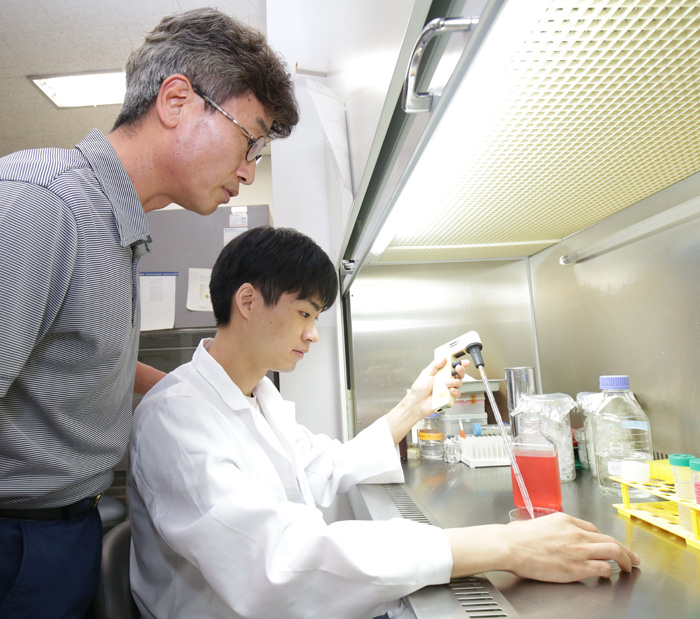Research Stories
Effect of Autophagy Regulated by Innate Signals on Cancer Progression
The study proposes that PRDX1 protein is critically implicated in cancer progression through regulation of innate signal and autophagy activation and suggests that the results will contribute to understanding of cancer development and progression in the future researches on various cancers
Medicine
Prof.
LEE, KI YOUNG
Researcher MIN, YOON
Prof. Ki Young LEE at School of Medicine published a research paper, "Inhibition of TRAF6 ubiquitin-ligase activity by PRDX1 leads to inhibition of NFKB activation and autophagy activation" in Autophagy, a highly prestigious journal (IF: 11.10).
Autophagy is the natural, regulated mechanism used by cells to sequester, remove and recycle waste. Autophagy has roles in various cellular functions including nutrient starvation, infection, cellular repair mechanism, and programmed cell death, thereby functionally implicated in human diseases, such as cancer, infectious diseases, neurodegenerative diseases, liver diseases, diabetes. Pattern-recognition receptors (PRRs) are expressed by innate immune cells and recognize pathogen-associated molecular patterns (PAMPs) as well as endogenous damage-associated molecular pattern (DAMP) molecules, and play a crucial role in the proper function of the innate immune system.
Recent studies have demonstrated that autophagy is extensively linked to innate immune signaling pathways mediated by toll like receptors (TLRs), which are a class of PRRs. Nevertheless, studies on the regulatory mechanisms of autophagy controlled by innate signals on cancer progression have yet to be investigated. Therefore, the objective of this study was to explore biological and functional roles of autophagy controlled by innate signals on cancer progression.
In this study, the researchers provided two insights into the pivotal regulation of peroxiredoxin 1 (PRDX1), which is well known as one of intracellular antioxidant proteins, in toll like receptor 4 (TLR4)-mediated signaling and autophagy activation. Through the cellular and molecular studies, the researchers propose that PRDX1 protein is critically implicated in cancer progression through regulation of innate signal and autophagy activation, and suggest that the current results will contribute to our understanding of cancer development and progression in the future researches on various cancers.
Fig. 1. The functional role of PRDX1 in autophagy activation in PRDX1-knockdown innate immune macrophages
Fig. 2. Cancer invasive ability in PRDX1- knockdown MDA-MB-231 human breast carcinoma cells and PRDX1- knockdown SK-HEP-1 human hepatic adenocarcinoma cells


